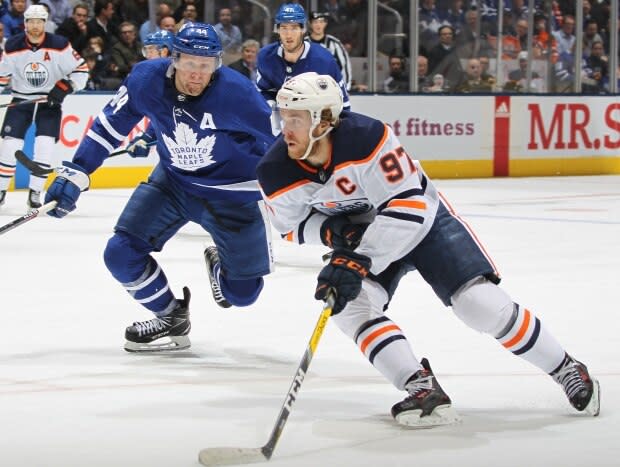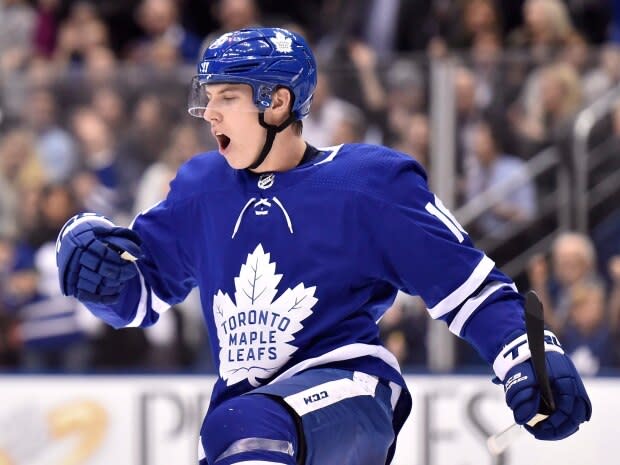Elite talent: The private school education of NHL All-Stars
Of the 37 North American players named to this year's NHL All-Star game or filling in as replacements, 15 — or 40 per cent — attended private school. It's a statistic that reinforces the notion that hockey, particularly at its very highest levels, is increasingly a sport not just for those who can afford it, but for those in the highest tax brackets.
Some attended athletic academies. The Oilers' Connor McDavid attended Premier Elite Athletes' Collegiate, a now-defunct private school in the Toronto area with an annual tuition that ranged from $15,500 to $27,000. The Maple Leafs' Mitch Marner went to The Hill Academy in Vaughan, Ont., (where Prep Hockey tuition is currently $13,000) and later Blyth Academy (where tuition is $15,995).
Carolina's Dougie Hamilton, who was named to the Metropolitan Division team but is injured, and St Louis goalie Jordan Binnington went to Crestwood, a private day school in Toronto, which currently costs $28,500 per year.
Tuition was even higher among some American players. Chicago's Patrick Kane went to Detroit Country Day School, where tuition is $32,200 US.
Max Pacioretty of the Las Vegas Golden Knights went to The Taft School, a prestigious private academy in Watertown, Conn., where day school tuition is $46,500 US and boarding runs to $62,500 US.

All the private schools offer scholarships and some sort of financial aid to those who qualify. CBC News was not able to determine if any of the NHL All-Stars who attended the schools received scholarships or financial aid.
But the number of private school alumni is astounding, considering the chances of any young hockey player having a steady — non-All-Star — career in the NHL are just .02 per cent, according to an oft-quoted study.
Game for the rich?
And it may be the starkest evidence yet of what some say is a growing socioeconomic exclusion in hockey due to skyrocketing costs.
"For generations — and I don't think that's overstating it — generations we've been talking about the cost of the game," says Sean Fitz-Gerald, author of Before the Lights Go Out: A Season Inside a Game on the Brink.
Fitz-Gerald's book suggests the expense of playing hockey now has the sport approaching a state of crisis, and that expense runs far beyond $300 sticks and $1,200 skates.
"It's power skating lessons, skills, development lessons and skating on treadmills. It's private coaching. It's all of these things and they start from the age of four. Sometimes I bet you you can go out and find one under the age of four," says Fitz-Gerald.

Parents can pay between $10,000 and $15,000 per year or more for their children to play in minor hockey's highest level, AAA. But as Fitz-Gerald notes, those are just capital costs.
"It's [also] the soft costs, the costs you don't necessarily think of," he says.
"Competitive tournaments now start on Fridays. Are you able to get that Friday off of work to go? Your child might have after school skating on a Wednesday or practice before school on a Thursday. Do you have the flexibility in your job to be able to accommodate that?"
All of that has the effect of winnowing down potential players not just economically but also geographically.
Fitz-Gerald cites a series of 2016 articles by Teri Pecoskie at the Hamilton Spectator. The series looked at players in the Ontario Hockey League (Major Junior A) and found 80 per cent came from neighbourhoods with median family incomes above the Ontario average of $80,987.
Roughly 15 per cent of the players came from neighbourhoods with median family incomes at least 50 per cent higher than average. And the vast majority of players also came from urban areas, which just happen to be where the expensive extra-curricular hockey training and facilities are often located.
It's a far cry from the days when NHL legends like Gordie Howe honed their game on used skates on frozen prairie ponds. Wayne Gretzky, whose father worked as a telephone repairman, addressed the differences in an interview on The National in 2016.
"Do you think your parents would have been able to support you through hockey in today's world?" asked Peter Mansbridge.
"Probably not," said Gretzky.
WATCH | Peter Mansbridge interviews Wayne Gretzky
The possibility that the next Great One might never become great due to lack of financial resources is very real, says Fitz-Gerald.
"Those [less well-off, small town] children statistically don't make it to the NHL anymore. Because today, statistically speaking, you have to be from a well-to-do part of an urban area," he says.
Number of players not dropping
Overall participation rates in hockey dropped for five straight years from 634,892 in 2013/14 to 626,090 in 2017/18. But the number of registered players in 2018/19 leapt back up to 643,958, thanks a huge jump in female players.
Hockey Canada is well aware of the economic constraints in the sport.
"When it comes to the cost of hockey, I think there's no doubt with hockey, just like all sports, as you get to the higher levels and more competitive levels, that cost does go up," says Corey McNabb, Hockey Canada's director of player development.
McNabb says Hockey Canada has several programs designed to make the game more accessible financially. The First Shift program offers full equipment and six on ice sessions for $200 as a way of introducing new players to the game.
There are also 150 Hockey Canada Skills Academy programs across the country that operate with local schools. They allow kids to get on the ice up to four times per week at a cost of about $750 per year.
At the same time, McNabb attributes some of the soaring costs of the sport to parents spending far more than required.
"I think parents need to sometimes take a step back and really look at how much is too much," he says.
"You don't need to be going to six hockey schools in the summer and being on the ice 12 months a year. I think that's one of the things that is a little bit of a misperception in the game right now."


